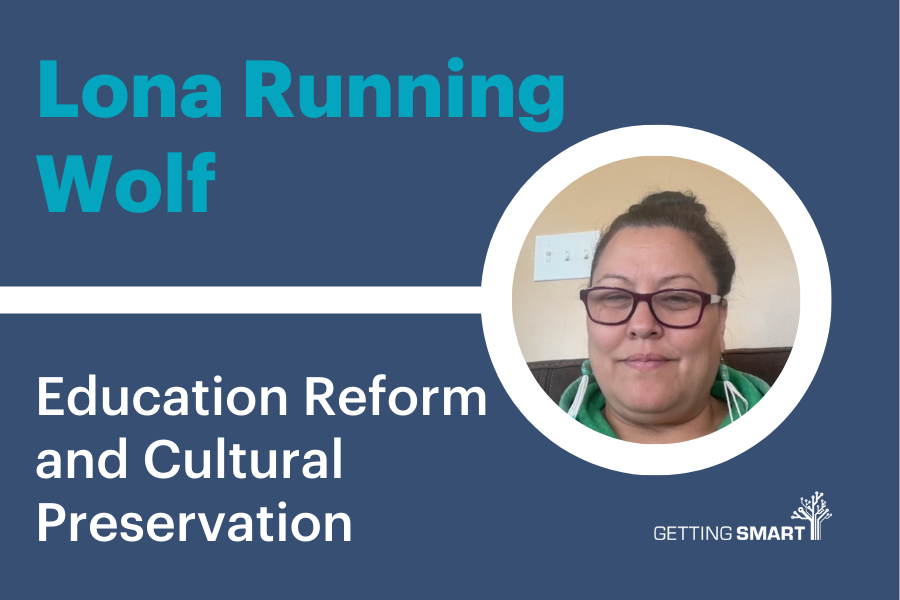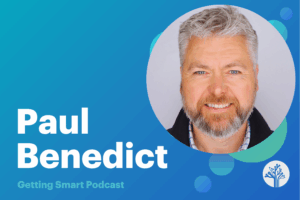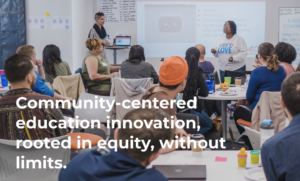Lona Running Wolf on Education Reform and Cultural Preservation
Key Points
-
Integrating culture and language into educational curricula is crucial for addressing the systemic challenges faced by Native students and promoting their academic and personal success.
-
Innovative and bold leadership is necessary to reshape educational systems to better serve diverse cultural backgrounds and support the holistic development of all learners.

This episode of the Getting Smart Podcast is part of a new short monthly series where Mason Pashia is joined by Dr. Jason Cummins, a previous guest and a friend of the podcast, to speak with indigenous leaders and academics to discuss how indigenous ways of knowing and leading can, and should, shape the education system.
On this podcast episode, they are joined by Lona Running Wolf from the Piikani Nation to discuss her extensive work in educational reform and cultural preservation. Lona shares insights from her journey, highlighting her current role as the project administrator for Blackfeet ECO Knowledge, a nonprofit organization aimed at reversing the effects of historical trauma on Native communities through cultural, language, and environmental initiatives. Together they discuss the systemic challenges faced by Native students, the impact of policies such as the boarding school era, and the importance of integrating cultural knowledge into educational frameworks to better serve diverse learner needs. Lona also discusses the profound influence of Blackfoot culture on Maslow’s hierarchy of needs, emphasizing a community-centric approach to education and well-being.
Lona Running Wolf
Lona has served in many capacities in education including as a teacher, instructional coach, curriculum and instructional leader, and a university adjunct professor. She has also worked with districts across Montana toward school improvement in her previous role at the Montana Office of Public Instruction as the Director of American Indian Student Achievement. She is currently a faculty member at the University of Montana Western working with the tribal grant partnerships of several tribal community colleges’ educator prep programs. She also is co-owner of 4-Poles Educational Consulting in which she provides consultation on Indigenous education and pedagogy. Lona has an Associate of Arts in Elementary Education from Blackfeet Community College, a Bachelor of Science in Elementary Education from Salish Kootenai College, and a Master of Education in Curriculum & Instruction- Triple Literacy from the University of Texas and is currently completing her doctoral program at the University of Montana. Lona and her husband Tyson Running Wolf are involved in the cultural revitalization of the Nitsitapii (Blackfoot) societies, ceremonies, and language and are cultural leaders in their community. They are blessed with seven children and ten grandchildren.
Links:
- Lona Running Wolf
- Blackfeet ECO Knowledge
- Shifting Educational Paradigms to Match Learners: Sustaining Cultures, Languages and Paradigms Through Educational Sovereignty
- Secretary of State’s Office staff attends Tribal Relations Training
- Black Feet Knowledge
- Decolonizing Systems: Reversing the Effects of Historical Trauma
- Dr. Vicki Howard
- Marvin Weatherwax
- School Wellness Wheel book
- Ruth Benedict: Research on highly synergistic societies
- The Emergence of the Breath of Life Theory by Cindi Blackstock
- Dr. Leroy Littlebear
Abridged Outline
- Lana’s Journey: From Education to Nonprofit Leadership
- Exploring Blackfeet Identity and the Impact of Borders
- Shifting Educational Paradigms and Addressing Historical Trauma
- Blackfeet ECO Knowledge: Merging Tradition with Modern Education
Jason Cummins: Hello, everybody. Jason Cummins here, happy to be on the podcast again with Mason, my good colleague. We have with us today Lona Running Wolf of the Piikani Nation. She’s an educational leader there and does training around the state. I’ve worked with Lona for a while when she was leading at the state level and also with the 2+2 teacher prep program that specifically prepares teachers to work with two particular Native nations. Welcome, Lona. I’ll ask you to introduce yourself.
Lana’s Journey: From Education to Nonprofit Leadership
Lona Running Wolf: Thanks, Jason. Happy to be here. It’s really good to see you again. We have a lot of experience and work that we’ve done together, which I think is really meaningful and has led to the work that I do now. I currently am the project administrator for a nonprofit organization called Blackfeet ECO Knowledge. I moved out of the education field, although the work I do in the nonprofit is still in that area, just outside the formal education system, which I’ll explain later why I think that’s important. Previously, I was the director of American Indian Student Achievement at the Office of Public Instruction in Montana. The work we did there was focused on improving school performance in our districts that are in the lowest five percent, which happened to be all the Native school districts in Montana. My role and my team’s role were to figure out why that was happening, even though we had some understanding, and to try to change the system to match the learners, which is not that easy to do. I also worked in the 2+2 program partnership between the University of Montana Western and Blackfeet Community College and with Little Big Horn College, where we designed teacher prep programs geared towards developing the skills of teachers to match the learners in those communities. Thank you for inviting me.
Jason Cummins: Yeah, that was pretty exciting work, and we have to shout out Dr. Vicki Howard as well from UMW. She’s just a super ally to a lot of our communities and does really good work.
Mason Pashia: Just on that point, for our audience, when you’re demonstrating a proficiency in the culture, is that like an assessment or how is that demonstrated?
Lona Running Wolf: For me, it’s not like an assessment. In the work I was doing with Blackfeet and LittleBigHorn, it was about developing their understanding of why, as teachers, we need to incorporate culture and language as the foundation of their classroom, not as a side thing. So, to me, proficiency means understanding. To truly know a culture, you almost have to be born and raised in it. When you have disruptions like the boarding school era, it can be problematic. It’s not about being proficient in the language, but about being motivated to bring the language into their classrooms and being open to learning the culture and incorporating it into their teaching. At the same time, we did have standards to ensure that teachers knew their culture at a basic level. So, it wasn’t an assessment per se, but more like a standard we wanted our teachers to meet when they left the program.
Exploring Blackfeet Identity and the Impact of Borders
Jason Cummins: Tell us a little bit about the Blackfeet. Aren’t there different bands?
Lona Running Wolf: Yes, there are four different bands. There are three on the Canadian side of the border: the Siksika, the Kainai, and the North Peigan. On the American side, there’s the Blackfeet. People may get confused between Blackfeet and Blackfoot, but the difference is if you’re in Canada, you say Blackfoot, and if you’re on the American side, you say Blackfeet. However, our true collective name is Niitsitapi, which means “the real people.” The bands are called Kainah, Kiksika and on the American side, we’re the Amskapi Piikani.
Jason Cummins: How does it work having the boundary of Canada and the United States right in the middle of your homeland?
Lona Running Wolf: It’s been really challenging. The border creates a division where you either belong to Canada or the U.S., leading to different histories. The bands in Canada have gone through different policies, some similar but some not, compared to our side of the border. These policies determine our connection to our culture. While both Canada and the U.S. had policies aimed at erasing our culture and language, the Canadian side held onto the language better. On our side, for some reason, whether due to harsher policies or other variables, we were more impacted in terms of retaining our culture and language.
Jason Cummins: In my previous work, I was fortunate to meet with Blackfeet leadership, like Pat Armstrong and Davis Marvin Weatherwax, who were really engaged in their communities’ issues. That’s when I first learned about the Jay Treaty Tribes, which are tribes at the border of northern United States and Canada, and at the southern border with Mexico. These tribes are guaranteed unfettered access to visit relatives across the border, but this hasn’t always been honored, leading to family separations.
Mason Pashia: Lona, could you provide a quick overview of your work around shifting educational paradigms for our listeners?
Lona Running Wolf: Sure. This work is a culmination of everything I’ve done in education and my personal journey of reconnecting to my culture. Changing a system entrenched in a dominant cultural worldview is extremely difficult, whether at the state or federal level. The article I wrote was a way to articulate my perspective on the urgent need for educational system reform. It discusses the significant mismatch between our educational system and the needs of our learners, which is evident not only among Native students but also non-Native students who are stagnating in their educational achievements. The system, as it is currently structured, serves neither effectively. The article calls for a change that acknowledges this disconnect and emphasizes the need for a shift towards educational practices that genuinely reflect and serve the diverse cultural backgrounds and learning styles of all students.
Mason Pashia: That’s incredibly important. Could you expand on the research and ideas surrounding Maslow’s hierarchy of needs and how that ties into your work?
Lona Running Wolf: Yes, about 13 or 14 years ago, while pursuing my bachelor’s degree at the University of Montana, I first encountered Maslow’s hierarchy of needs. It appeared straightforward—fulfill one level of need to progress to the next until self-actualization is achieved. However, it wasn’t until I attended a workshop by my elder, Narcissus Blood, that I realized there was much more to it. Maslow developed his theory after researching the Blackfoot, which challenged his initial assumptions about what motivates people. Unlike his prior beliefs that personal gain drove human behavior, he found that the Blackfoot community demonstrated a profound self-awareness and esteem that was not driven by materialistic desires.
Our research has shown that Maslow’s concept was profoundly influenced by his time with the Blackfoot people, who emphasized community and cultural continuity over individual achievement. This communal focus is something that was somewhat lost when Maslow translated his observations into what we now know as Maslow’s hierarchy of needs.
It’s crucial to understand that while we speak about the past impacts of U.S. policies and the boarding school era on our cultures, these influences extend into the present. These historical traumas, while rooted in the past, continue to affect us today because the policies and their consequences have not been fully addressed. This ongoing impact is what we see in the educational challenges and social issues within our communities. It’s not just about overcoming past traumas but about actively dismantling the remnants of these policies that continue to hinder our progress.
Jason Cummins: So for our listeners who aren’t aware of the horrors of boarding schools, can you talk about the results of that we see in our schools today and what we could do about that when serving our students?
Lona Running Wolf: Yeah, just to go along with what I was talking about with the research of Maslow and all that, what they basically did was take a snapshot of our culture at that time and place in the 1930s. Even though U.S. policies were already in play that were eroding our culture and our systems, there was still enough in our communities that Maslow and Ruth Benedict saw. So even without us being fully intact in our ancestral paradigm, there were so many policies that were happening with the true intention of breaking down exactly what I talked about—breaking down that synergistic society, breaking down all the things that made our people, all Native Indigenous people, self-actualized, and stopping the transmission of our culture and language. The boarding school era was one of the main policies that did that work, but there’s much more than just the boarding school era. There’s the Sixties Scoop, the Relocation Era, the Dawes Act—so many different policies that were intentionally and purposely meant to break down those systems.
People think that, and we call that historical trauma, which is true. It happened—it was a trauma that happened back in the boarding school era or when those policies were first enacted. But the problem is that we haven’t cleaned up those policies, even though they don’t exist anymore. We haven’t stopped the effects of those policies. For example, the Dawes Act is a policy that still affects us today. It was stopped, but the policies put in place still exist today. That’s why we have so many jurisdictional issues and land issues.
Basically, what I’m saying is that the boarding school era happened in the past, but it started generational cycles. At the boarding schools, the family dynamic was intentionally broken. The ability or understanding of raising children and creating a positive self-identity in children as parents, family, and community was intentionally shattered. That doesn’t mean all aspects of us were lost, because we had enough resiliency to hold on to a lot. Somebody at a training recently said you can think of the boarding school era like an egg. Every time a policy came about, the shell was getting cracked, and the pieces of the shell fell away, but the membrane stayed intact. That’s where we are right now—our membrane is still intact, but it’s very delicate. We don’t have that hard shell around us to help protect us.
The boarding school era did that to us, and today, what we see in our communities are high levels of negative coping mechanisms passed down through generational cycles. We’re at the highest level in every negative statistic, but that’s not who we are. That’s just the product of the boarding schools and all those policies.
Jason Cummins: Yeah, we’re still here. Resiliency is definitely in our DNA. What can school leaders do to address a lot of these issues because it seems like a big issue? I like what you said about how the effects of those policies are still here. It’s like if you throw a rock in a pond, and right now we’re feeling the waves of it. It’s against the law to forbid Natives from speaking their language, but in practice, we know a lot of educators still try to do that. I think that’s where some of our work at the state level intertwined within my community. We had educators who were unaware of the federal protections of Native languages, and we were trying to get the state to support the federal policies. What can school leaders do about that? And if you’re comfortable, we can also talk about the work at the state level.
Lona Running Wolf: That’s so true. Just thinking about that membrane that’s left, that’s the resiliency we have, and it’s holding us together right now. But those little pieces of the egg are still laying there, and they’re shattered. What school administrators need to do is put as many pieces back as they can, those protective layers. We did a research study when I worked at OPI to give voice to our people in the trenches working with Native students. I wanted them to share what they felt were the issues causing the achievement gap. Not surprisingly, what we got out of that study was all the stuff we’re talking about today. Very little had to do with whether our students were intelligent enough to do well on tests or in the educational system. It had everything to do with all these issues we’ve already discussed.
The hardest part for school administrators to understand is that if they’re not thinking about putting those pieces of the egg back together, they’re just kicking the can down the road for our students, who will never be able to get past that resiliency stage. Like I always say, I’m tired of being resilient. I don’t want trauma in my family or my life anymore. Our communities are tired of it too. We want to be successful, and we are in many ways, but the statistics are what they are. School administrators have to think outside the box that the state levels tell them are the answers. They have to be willing to incorporate elements like culture and language, things that build a strong self-identity, and put those on the same level as academics.
Understand that they’re spending all this money and effort on instruction, and it’s not yielding the results they want. If they invested the same effort in the social and emotional side of students and put as much emphasis there as they do on academics, they would see the results they’re looking for. It takes thinking outside the box, because it’s scary for an administrator to go against the grain. That’s what administrators really have to do.
Jason Cummins: They can. The thing is, as a school leader or school board member, I know there are challenges, but they can make positive changes for their local community. It’s strange to think that almost every teacher who has graduated with a teaching degree has learned about Maslow’s hierarchy of needs, but we’ve rarely seen it implemented.
Jason Cummins: We understand it, but we’ve rarely seen a school system try to serve students’ needs.
Lona Running Wolf: That’s the problem. The educator prep programs are the first cog in the system. They get into the prep programs, and they’re indoctrinated into the same mainstream idea of education. They’re taught the same things, with an emphasis on math and reading. I’m not saying we don’t need strong academics in our schools, but they don’t spend time looking at the whole child in educator prep programs. That’s why our educator prep programs were so different, because we balanced that. We really pushed the whole child approach on our teachers, focusing on culture, language, family dynamics, community structures, and the breakdown of culture. We did all that. So when we sent these teachers into the field, they weren’t indoctrinated into that system. But then they get into the school system and are told to use this curriculum, follow this program, teach with fidelity, follow this schedule. It’s so prescriptive that it’s hard to get out of that system.
Jason Cummins: Even though the data says it’s not working, looking at the achievement gap, a lot of our students for whom the system works have those elements you mentioned working in their favor. It is their culture, their history, their language—that’s the default of the school system. So there aren’t the same learning barriers that other students might face.
Lona Running Wolf: I saw somebody say, “We don’t teach culture in our schools.” This person replied, “What are you talking about? You teach it every day. You teach American culture every day.”
Jason Cummins: Those conversations are important. Because it’s the default, we often don’t recognize it, like the proverbial fish that doesn’t know it’s in water.
Mason Pashia: Being mindful of your time, Lona, I may pivot to what you’re up to now. Earlier, you mentioned that you’re working with Blackfeet ECO Knowledge. Can you give us an overview of what they’re doing and how it extends the legacy or mission you’ve been leading for your career so far?
Lona Running Wolf: Yeah, as we’re doing this work, there are so many different levels to consider. The policies today, like the Every Student Succeeds Act, allow school districts to incorporate culture and language. Your Title I funds can be used to incorporate whole child approaches. That’s the whole premise of it. But what I saw is that our own people are afraid to move outside of this system, and that’s part of the fracture of our culture and paradigm. I tried to make a lot of changes at the state agency level, but it was very difficult. My dream is for Native students to be in schools that aren’t just inside buildings—they should be out in nature, on the land, learning our stories and songs, connecting to the landscape, understanding ecosystems and how our actions affect climate change. My dream is to blend the new world we live in with technology and the things we taught our kids pre-contact. But doing that within the system is too hard.
Blackfeet ECO Knowledge is all about reversing the effects of historical trauma. We want to measure and reverse language loss and the disconnect from the land and environment. We want to see people using the land appropriately through hunting, land use, and stewardship, and practicing our culture, reversing cultural loss. Historical trauma didn’t only happen to the people; it happened to our environment, land, animals, language, culture, and people. All our projects aim to reverse these effects. One project we do is the Blackfoot Way of Life Project, where we develop modules about our culture and take participants through the journey of our stories, with the main story being Scarface. These modules help create an understanding of our culture. We also have language-based projects and others focused on the land or buffalo.
My husband, Tyson Running Wolf, and I co-created Blackfeet ECO Knowledge as a nonprofit organization. Our intention is to deliver these educational tools to organizations that don’t have the funding or ability to include them in their programs. We partner with schools, tribal programs, and various community organizations to break free from the fear of our culture and practice the top part of our hierarchy of needs. That’s the work we do.
Jason Cummins: That’s exciting work.
Lona Running Wolf: Yeah, and hopefully one day, we’ll be able to infiltrate the system itself, although it’s very difficult. We hope this work will be constantly embedded into the system until it starts to change its motion.
Jason Cummins: As a practitioner, just experiencing school and never having a different example of what school could be, people replicate the system they experienced. When we first created language programs, we were afraid in a different way—how are we going to do this? At the state level, people were afraid too, wondering what we were doing. Historically, when it came to our cultures and languages, the school was the steamroller that rolled over them. It was fine to have German, French, and Spanish in school, but people were uncomfortable with indigenous languages.
Lona Running Wolf: Yep, it’s still like that today, but it’s a lot better than even five years ago. Because of the work you all did, not being afraid to incorporate that, there’s now research showing that language immersion classrooms are not only successful in their own language and culture, but they actually do better than English-speaking classrooms in reading. There’s research now behind that because people weren’t afraid to try.
Mason Pashia: My two wrap-up takeaways are about the ways in which educational leaders are not only urged but very able to work within current policies to make these changes happen, as well as a litany of amazing names and resources for people to dig deeper. We’ll include links to those folks referenced throughout, who are doing critical research on these topics. Thanks for joining, and everyone, thank you for listening.
Lona Running Wolf: Thank you guys so much.









0 Comments
Leave a Comment
Your email address will not be published. All fields are required.